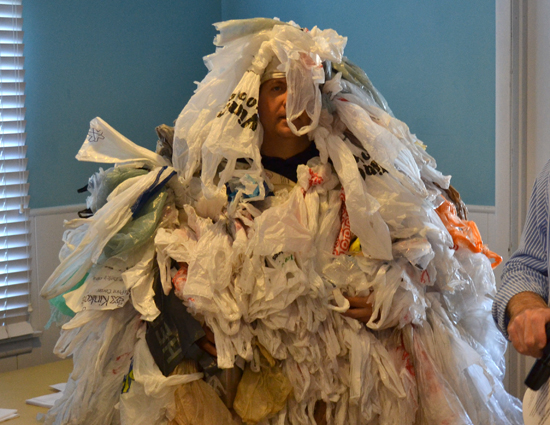
08.14.12
N.J. legislators listen to ideas on saving Barnegat Bay, banning plastic bags in shore hearing
By Chair Paul Stenzel, of the Surfrider Foundation, attended Monday's hearing dressed as a plastic bag monster. Plastic bags should be banned, he said.
Paul Stenzel, of the Surfrider Foundation, attended Monday's hearing dressed as a plastic bag monster. Plastic bags should be banned, he said.
MONDAY, AUGUST 13, 2012 BY MICHAEL LINHORST; STATE HOUSE BUREAU; THE RECORD
The Barnegat Bay is in danger of dying from runoff waters tainted by fertilizers, experts told lawmakers meeting at the Jersey Shore Monday where they also considered a ban on plastic shopping bags, another widespread source of pollution.
The United States consumes 102 billion disposable plastic bags each year, Chris Len, of the Hackensack River Keeper, told a joint meeting of the Senate and Assembly environment committees in Lavallette. The bags create so much litter, he said, that in the winter “some of the trees look like they have leaves” made of plastic.
Disposable plastic bags are “one of the bigger problems that face our watersheds,” Len said.
But speakers at the hearing could not agree on how to stop the litter.
John Weber, of the Surfrider Foundation, said that encouraging the public to use reusable bags and recycling plastic ones is not enough. “You can give away as many reusable bags as you want,” he said, but only a portion of the population will use them as long as single-use bags are easily available.
Weber said plastic bag recycling programs are unsustainable because the bags are not turned into new bags – the material winds up in park benches or other plastic products instead. Paper bags have their own sustainability problems, so it is not a question of paper versus plastic, he said, but of single-use versus reusable.
Rather than focusing on public education or recycling, Weber said stricter measures are needed.
“Bans work, fees work,” he said. But “education is only going to go so far.”
A bill introduced in the Legislature in January seeks to reduce plastic bags with both a fee and a ban. It would charge a 10-cent fee for every plastic or paper bag a customer receives starting in January 2013; two years later, a ban on all non-compostable or non-recyclable shopping bags would take effect. The bill, sponsored by Sen. Brian Stack, D-Hudson, has not gotten out of committee. He introduced the same bill in 2011, and it also failed to advance.
Paul Stenzel, another Surfrider representative, attended the hearing dressed as a “plastic bag monster.” Plastic bags should be banned, he said.
“We want people to realize the impact of single-use plastic bags on their coastal communities,” he said while standing in a corner of the hearing room, covered in dozens of plastic bags.
But business representatives said community education was the answer to plastic bag litter, not a ban or a fee on the bags.
“We believe that educating our customers about recycling opportunities” is more effective than a ban, a spokeswoman for ShopRite said. The grocery chain has a recycling center in Elizabeth that recycles plastic bags and other plastic products the stores generate, she said.
ShopRite, along with other retail companies, also sells reusable bags customers can use instead of the free, disposable plastic bags. Shoppers get rebates for bringing their reusable bags and not using new ones.
At the start of Monday’s hearing, which was held a block from Barnegat Bay, the legislators heard about the decline of that bay’s ecosystem and the possibility that life in it could eventually be wiped out.
The bay is in “insidious ecological decline,” Rutgers University Professor Michael Kennish told lawmakers. The environment has been “heavily degraded” for decades, he said, and it is getting worse.
Pollution – much of it fertilizer runoff from the heavily-populated towns near the bay –has gotten so bad that all life in some areas of Barnegat Bay is at risk, Kennish said.
Fertilizers are carried into the water by storm runoff that is not properly managed by municipalities, he said. Once in the bay, the chemicals can spawn algae blooms, which reduce the amount of oxygen dissolved in the water and block sunlight from reaching aquatic life below the surface.
Fertilizer runoff is “like a cancer to the estuary and the system,” Kennish said. “It’s one of the worst things you can do to an estuary.”
Kennish said the only long-term fix for the problem is better regulation of land use near the waterway. More than 10 percent of Ocean County is made up of “impervious cover” that rain cannot penetrate, he said. That cover includes roads and parking lots but also lawns, which do not tend to soak up rainwater.
The impervious cover lets rainwater run off rather than absorbing it, allowing the water to carry fertilizers into the bay. Kennish said reducing the amount of impervious cover would reduce the fertilizer that winds up in the waterway.
